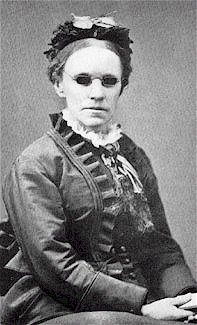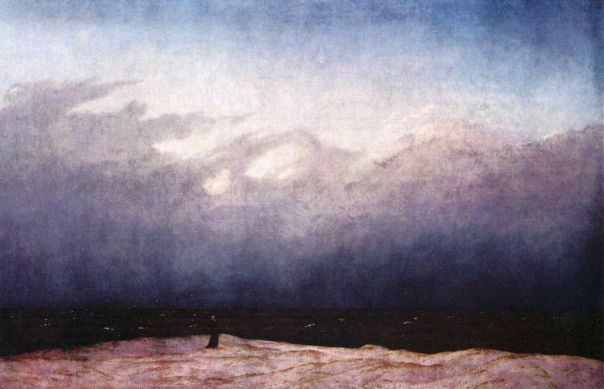
Caspar David Friedrich [Public domain], via Wikimedia Commons
I’ve heard the proposition that evil is nothing but the complete absence of good. We Christians especially seem to like this way of thinking about where the bad in the world might have come from. It’s a tidy solution to the conundrum of whether or not God created evil (if God created everything) and whether God can really be good if He did create evil. If evil is just a void, we don’t have to worry about where it came from; it came from nowhere.
I don’t think this solution is true, though. My life has been safe and sheltered, so my encounters with anything I’d characterize as real evil have been few and brief, but whenever I’ve had that contact, I’ve been left with the indelible impression that what I’d encountered was not just an empty space. It had form and substance. Flavor and color even, strangely.
I suppose it’s conceivable that evil started out as an empty space, but if that was ever the case, something seems to have shown up to fill it.
I don’t know very much about the theology of evil and its myriad possible sources (and it sounds like a terrible topic to explore, so I’m not likely to in the near future), but I’ve come to think of humans as a series of tubes. We either let God & goodness or evil come through us into the world. (Or possibly, I guess, we can try to just stuff ourselves up and not serve any function at all.) This is probably not how the cosmos works, but I find it useful shorthand to explain to myself the mess the world is in and my role in it. It gives me a handhold to grip. It means that even if we’re helpless to single-handedly heal the tragedy we find ourselves witnesses and parties to, there is still a direction we can move toward.
It means that we can let light in.
I find it easy to get bogged down in the negativity of my religion in this place and time. We’ve let the culture wars push us into a position where we base our corporate identity in opposition, an innately negative place to be. I’m not the only Christian to voice concern that we’ve become publicly defined by what we’re against, a list that too often—at least at face value—includes help for the poor, mercy for the prisoner, refuge for the alien, and justice for the oppressed. As much as I’d like to believe that the most outrageous of these oppositional stances are the unnuanced exaggerations of a vocal minority, I’m sore from hearing Christians in my own circle say heartless things without reservation or regret about people we supposedly believe God made and loves AS MUCH as us. In this climate, it’s difficult for me to hold the image of God as loving Father in my mind. The more loudly I hear my coreligionists declare that people deserve what they get, the harder it is to believe that we serve the same God that Jesus described in the parable of the Prodigal Son.
The harder it gets to believe that God is good.
This is funny because God being good is the whole point of Christianity. According to John, the message of Jesus was that, “God is light, and in Him there is no darkness at all.” You know, all that sight-to-the-blind and release-for-the-captives stuff. Rebirth from death into incorruptibility. The kingdom of God among us. Burdens lifted. Sins forgiven. Freedom. Light that the darkness doesn’t overcome. All that outrageous, impractical stuff that tends to get spiritualized, qualified, symbolified, or that-was-then-ed out of the picture of how we live and think about ourselves and others. The Sunrise from on high is a little too bright, cuts too sharply. We tend to prefer to act as conduits of a more manageable and rational half-light.
Grace, after all, has never been the pragmatic approach to behavior modification.
The temptation for those of us who want something more than this dimmer-switch modification of the Gospel is to form a double negative identity around being against the Christians who are against these other things. But this amounts to trying to increase the light by stopping ourselves from letting in half-light, and that isn’t the same as opening ourselves up to let the true light flow freely. And, of course, if the problem is that what others see as light seems to us more like darkness, we should know better than to try this approach. Everyone knows you can’t get rid of darkness by blocking it out. You have to promote, not negate.
You have to let light in.
We have, perhaps, grown too big in our own minds. In C.S. Lewis’ Perelandra, he puts the following words in the mouth of an archangel speaking to the protagonist, Ransom:
“Be comforted, small one, in your smallness. [God] lays no merit on you. Receive and be glad. Have no fear, lest your shoulders be bearing this world. Look! it is beneath your head and carries you.”
It’s not our place to carry the world. Seeing what happens here might break our hearts, and maybe that is part of our job, to see and to acknowledge that this is terrible, to try to fix it and fail. And maybe part of the point of it being terrible and unfixable—if it can be said there is a point—is to get us to see that we are small and helpless, because where there is helplessness, there is no good that we can do, and where we can do no good, there is no responsibility to try ourselves to do it, and when we can no longer cling to a responsibility that isn’t ours, we can start to learn to open and only receive and be made into a conduit for the One who took all responsibility upon Himself, twice—once when He made the world and again when He died and came to life again in it. He is the healer; we are merely the healed.
Maybe before we can even understand what it means to campaign for peace or love or justice, we have to die in the mud and be healed back into His life ourselves.
We walk in a dark place. We’re children in pain among children in pain, to whom none of this makes sense. But as Jesus said, He has not left us as orphans, and God doesn’t always hide Himself. I’ve been surprised over and over to find that this is true: In the room without windows, sometimes when I close my eyes and stop staring into the darkness, I can feel my hand in His.
And for no good reason I can understand, a light occasionally startles through my veins and out into the world.

 It has been said people remember not what you do, but how you made them feel. I’m not a “quick to make you feel at ease” type of person. I pull no punches and say awkward things at the most inappropriate times. I also have a habit of saying too much all at once (too often). I am only aware of these instances after the moment has passed. Most of the time I have an objective, or a goal to accomplish because I see right through all the bull, the masks and the lies people tell themselves for their objectives and goals. Nevertheless, I have become more aware of the havoc I create by acting as my own form of “The Justice League” instead of looking within myself. I think I am helping someone when in reality, I am only serving myself. It’s a delicate balance to develop a social filter.
It has been said people remember not what you do, but how you made them feel. I’m not a “quick to make you feel at ease” type of person. I pull no punches and say awkward things at the most inappropriate times. I also have a habit of saying too much all at once (too often). I am only aware of these instances after the moment has passed. Most of the time I have an objective, or a goal to accomplish because I see right through all the bull, the masks and the lies people tell themselves for their objectives and goals. Nevertheless, I have become more aware of the havoc I create by acting as my own form of “The Justice League” instead of looking within myself. I think I am helping someone when in reality, I am only serving myself. It’s a delicate balance to develop a social filter.


